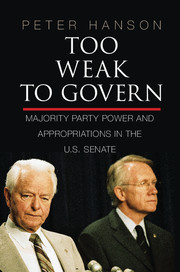6 - Conclusion
Published online by Cambridge University Press: 05 November 2014
Summary
“To avoid an omnibus, you need to do twelve bills. Right now, the Senate ... cannot functionally do twelve bills on the Senate floor” (Staff Interview F 2012). The staff member’s observation captures an essential relationship between omnibus spending bills and the power of the majority party in the Senate. The Senate majority party is likely to abandon the regular order when it is weak and faces difficulty managing the floor. Its decision to do so influences legislative outcomes in the Senate by reducing opportunities for all members to participate in lawmaking and by helping the majority to assemble a bipartisan coalition for the budget.
The majority’s influence has important consequences, but there are limits to what it can accomplish. The majority party can protect its reputation by shielding members from difficult votes and passing a budget, but there is no evidence that it can systematically pursue its preferred policies. These findings show that the majority party has more influence than has been understood in the traditional view of the Senate but less than revisionist accounts would suggest. They also demonstrate that partisan models of Congress written for the House of Representatives, such as Conditional Party Government (CPG), do not accurately describe the Senate.
- Type
- Chapter
- Information
- Too Weak to GovernMajority Party Power and Appropriations in the U.S. Senate, pp. 160 - 166Publisher: Cambridge University PressPrint publication year: 2014
- 1
- Cited by



